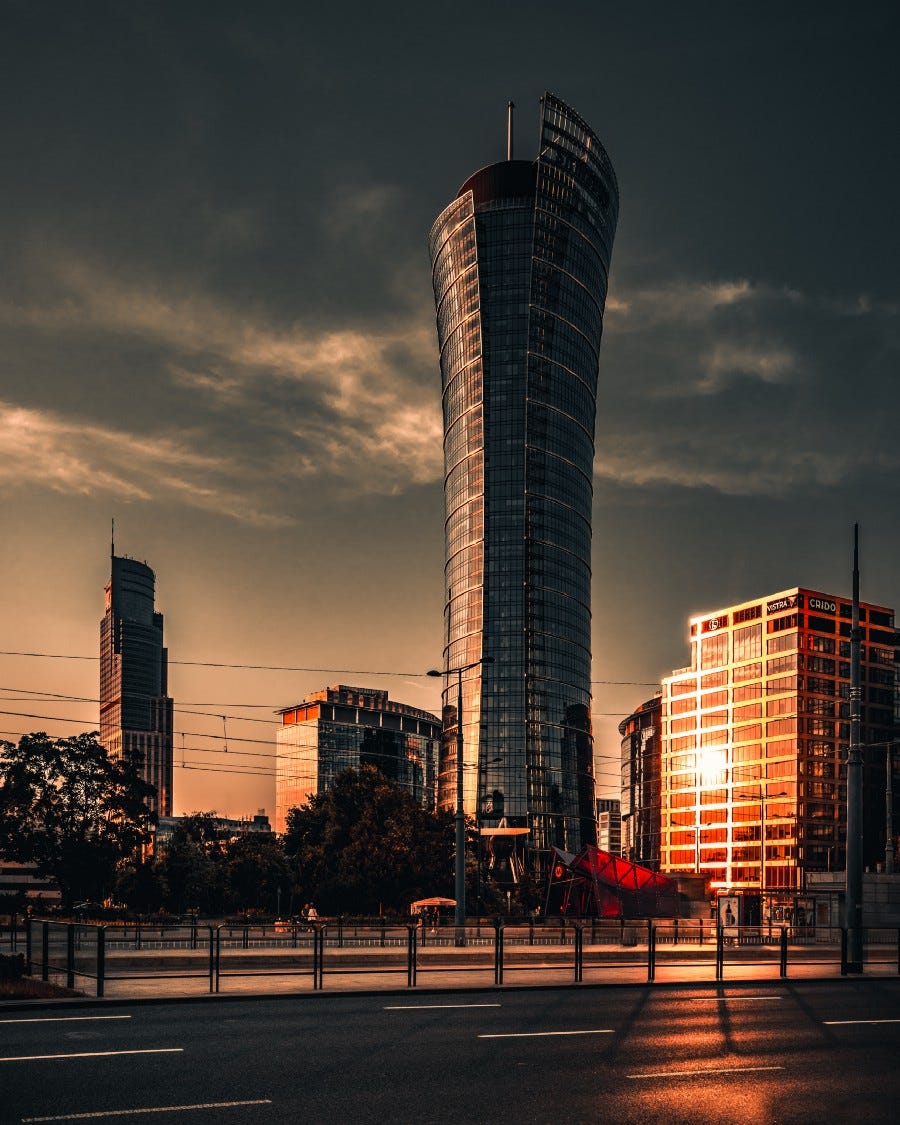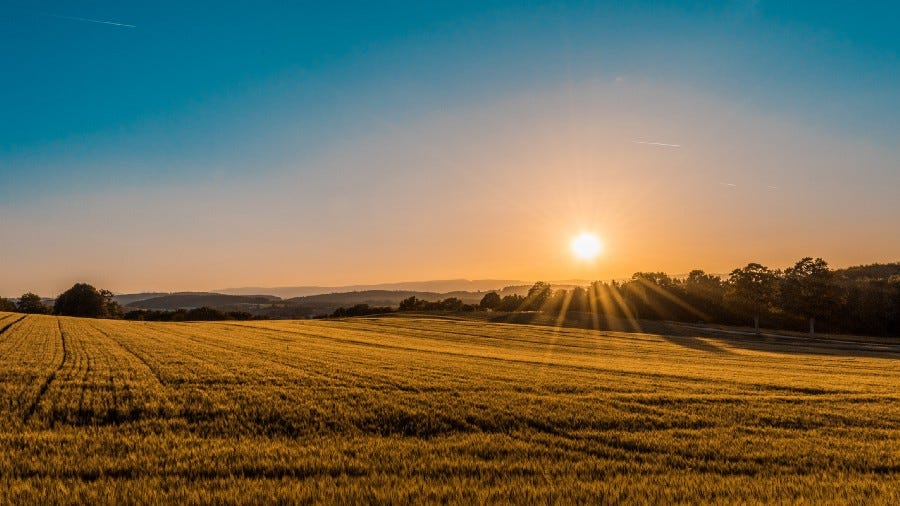The Glorious Indifference of Nature
Why it's great that the natural world doesn't care about you

Photo by Jonas Weckschmied on Unsplash
I’m not one of the world’s great nature-lovers, but I’m lucky in two ways: (1) I live by the sea, and (2) I have access to a garden.
Over the summer we decided to mow two different shapes into the grass — a spiral made up of longer and shorter grass, and a plain circle. At first we just mowed around the edges of the circle until the grass inside was significantly taller than the rest of the lawn, then we finally cut it down to the level of everything else. For the next few weeks we had a circle of yellowish grass in the middle of a pure green lawn.
The initial plan had been to plant flowers in the circle, but the yellow-on-green effect was so bizarre and interesting by itself that we decided not to bother in the end. We’d ended up with the ideal complement to the spiral: where the one was perfect for walking meditation, the other was perfect for sitting meditation.
The first time I tried meditating in the circle I decided to focus intently on my immediate surroundings. I concentrated on one object or area, then another, then another, trying to take in the detail of each thing without pushing my mind too hard. It was great fun: I heard sounds I normally wouldn’t be attuned to; I enjoyed the way individual blades of grass combine to produce a collective wash of colour; I became fascinated by a creature that looked like a flying beetle with brilliant blue wings. (I wasn’t high, I promise.)
And after a few minutes I finally understood why some people talk about getting out in nature as if it’s the most profound, wonderful thing in the world. As I watched that weird flying blue beetle thing I thought, ‘Whatever this is, it doesn’t care that I’m here. It’s just going about its business. It’d be doing the same thing if I wasn’t here, but because I am I get a front row seat’.

Photo by diGital Sennin on Unsplash
In other words, I fell in love with nature’s apathy towards me. If I’m sitting in a yellowish circle in a garden everything I’m looking at exists for its own sake, not for mine. I interact with all of it purely as an observer, someone who’s impressed by the natural world’s beauty and style.
But the minute I go back inside I’m surrounded by a world made by humans for humans. Everything is dead, sterile. The objects I surround myself with don’t have lives or business to be going about. They don’t exist for themselves, they exist for me. Their only purpose is to fulfil the functions they were designed for and satisfy my whims.
If I wanted to, I could easily ignore the garden, the promenade and all my local nature walks and divide all my time between my flat, my car, the train and my favourite restaurants, cafes and shops. It might not even feel like a great loss.
But then (1) nothing I encountered would be alive except for my fellow humans, (2) everything would be designed for my convenience and pleasure, and (3) none of it would have any worth or dignity except as it related to my convenience and pleasure.
There’s a sense in which an entirely human-designed environment isn’t a truly external environment at all. It’s more like an externalised collective Mind, a shared playground of human imagination. Video games might be one more step removed from basic reality than modern cities, but in many ways it’s a difference of degree and not kind.

Photo by Adam Borkowski on Unsplash
Obligatory disclaimer: cities are fun, video games are fun. But after my circle experience I couldn’t help feeling that there’s something inherently narcissistic about building a fort then spending 24 hours a day playing in it. Everyone knows that if your flat is so untidy you can’t move you’ll start to feel psychologically constricted, and that if you’re surrounded by space and beauty that’ll have a correspondingly positive effect. It’s starting to seem to me that cities and nature similarly suggest entirely different worldviews, and that the people who inhabit them start to absorb those worldviews by osmosis.
It’s a common complaint that modern urban life reinforces alienation — all the bigness, deadness, lack of connection to random passersby. Back-to-the-earth types add that it’s infantilising, draining us of our self-reliance in favour of a pathetic dependence on our electronic slaves.
What’s less frequently remarked on is how the city reinforces ego and narcissism: after all, we designed this environment to suit ourselves, and it constantly reflects us back to ourselves. The appliances around us are tolerated as long they spit out a limited amount of predetermined results and hated the second they fail or falter — how do you react when a vending machine doesn’t give you your change?
Then there’s the irony that any environment that we build starts to fit us into its mould after a while. Our mechanised surroundings encourage us to be as quick, hyperfunctional and productive as the machines we rely on — just look at how city people walk compared to country people. The city’s worldview is goal-oriented, use-or-be-used; it only tolerates straight lines and smooth edges.
The first thing city people notice when they enter the country is how much slower everything is, how little there is to do. (I’m sure there’s more to do if you aren’t just visiting.) By removing all the elements that normally distract us from ourselves, the environment dares us to look inward and see what’s going on.

Photo by Federico Respini on Unsplash
But there’s a little more to it than that.
The natural world simultaneously cares about us less and more than cities do, and it’s to our benefit in both cases.
Less because nothing in nature was designed to make life easier for you — everything has its own agenda, and if you get involved you’re more likely to hinder than help. This has the effect of taking the ego down a peg, reminding you that you’re just one small part of the biosphere and it’s best to get in the way of the other parts as little as possible. We might benefit from other elements of the ecosystem, but only as a byproduct of their self-directed activities and not in the same linear way we benefit from machines. Nature takes from us as much as it gives to us, and its way of doing things is always messy and often uncomfortable. It’s not a matter of pushing a button and getting the correct change.
More because we’re among our own here — living entities that want a lot of the same things out of life as we do. This was the environment that gave birth to us, shaped us and fed us for millions of years, and most of us have a more or less thoroughly buried part of ourselves that feels at home in it. This gives us a feeling of integration, rightness, being part of something greater than ourselves.
So the thing about nature that humbles us — ‘You’re just a small part of a big world’ — is the same thing that makes us feel happy and integrated. Whereas in the city the thing that exalts us — ‘You’re surrounded by efficient electronic slaves’ — is the same thing that makes us feel alienated and destabilised.
No wonder the great religions are so into their natural metaphors.

Photo by Vishal Banik on Unsplash
Taoism is especially nature-obsessed. Its repeated call to “Do without doing” models itself on the automatic, thoughtless — but not chaotic — processes of the wild, ‘unforced and always natural’ (Tao Te Ching, ch. 51). Again and again Lao Tzu encourages us to observe the way nature works and copy it — be like the wind and rain, be like uncut wood, be like water. Here’s one of the more interesting metaphors: ‘The ten thousand things arise together; in their arising is their return. Now they flower, and flowering sink homeward, returning to the root. The return to the root is peace’ (16). Jesus strikes a similar note in the Sermon on the Mount: ‘Consider the lilies of the field, how they grow. They don’t toil, neither do they spin’ (Matthew 6:28).
In other words stop worrying so much, the flowers are looked after and so are you. The everyday anxieties and feverish planning that go with city life are built on a fundamental narcissism that says we can organise our lives the way we want to if we just think hard enough. Nature’s message is that the less overthinking, planning, manipulating and controlling we do — the more we live as spontaneously as birds and as uncompetitively as water — the happier we’ll be. Forests and mountains suggest transcendence not only because they’re beautiful, or because their vastness and busyness put our problems into perspective, but because their festina lente approach shows the obsessive chattering of the “monkey mind” for what it is.
Is that you Doubting Fred? What do you want now?
‘I’m sorry, but this is a ridiculously sentimentalised take on nature. If you look even slightly below the surface it’s “red in tooth and claw”, full of slaughter, pain and parasites. Humanity escaped the natural world for a reason, and we only enjoy it today because we’re tourists in it. It’s all very well to spend the day hiking if you can retreat to your heated, well-lit apartment later that night. As for your garden, it contains exactly as much nature as you allow it to. Now that the world’s at our mercy rather than vice versa it doesn’t inspire the same awe it used to.’
You win, Fred. I’m a town dweller at heart, I like it indoors and I’m typing this on a complex electronic device that I spend a lot of my time on. And people with my medical history don’t get to be Luddites.
All I’m saying is that you can enjoy the benefits of technology from a distance, without letting them lull you deeper and deeper into samsara. Nature’s worldview — that you don’t matter because you’re surrounded by subservient robots but because you’re a valuable thread in an infinite web; that ultimately you’re not in control of anything; that spontaneity and stillness beat planning and fretting — is the correct one. It’s possible to reach the same conclusions from your armchair, but personally I find it easier to feel them when I’m surrounded by living, breathing metaphors.

Photo by Geran de Klerk on Unsplash
Tourism actually isn’t a bad analogy. Occasionally refuelling in nature has a similar effect on me to travelling, or playing music, or reading about long-gone civilisations. All these experiences relativise my “normal” life by placing it in a broader, wiser, more colourful context, giving me a freshness and energy that I can carry back with me to my everyday work and leisure. My ambition is to get better and better at the “carrying back” part until the mundane parts of my life and the “tourist” parts feel roughly the same.
In the meantime here’s to yellowish garden circles and strange blue beetle-like things. You make the world a better place.





The late poet Mary Oliver spoke about the 'otherness' of nature being an antidote to the traumas of life.